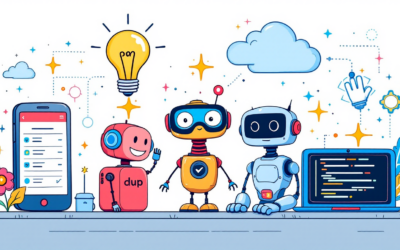null
Will AI Eventually Take All Our Jobs?
Artificial Intelligence (AI) is no longer a distant concept of the future. It’s here, and its impacts are already being felt across various sectors. But just how significant is its influence? Are we really on the brink of an AI-induced employment crisis?
Projected Job Replacement by AI
According to recent studies, AI could potentially replace between 300 and 800 million jobs worldwide by 2030. In the US alone, approximately 45 million jobs may be overtaken by AI during this period. Globally, around 14% of the workforce—or about 375 million workers—might need to change careers due to AI advancements.
AI’s Current Impact on Job Loss
Even as we speak, AI has caused the displacement of 14% of workers due to automation. In May 2023 alone, there were 3,900 job losses directly linked to AI in the United States, representing 5% of total job losses that month. Is this a precursor to more widespread changes across the employment landscape?
Sector-Specific Impacts
The impact of AI on jobs isn’t uniform across all sectors. In advanced economies, 60% of jobs are at risk of AI automation compared to 26% in low-income countries. The tech sector, in particular, has witnessed significant disruptions, with over 136,831 jobs cut this year, marking the largest reduction since 2001.
Economic Impact and Employment Transition
Though AI poses a threat to current job structures, it also offers economic benefits. By 2030, AI is expected to contribute a staggering $15.7 trillion to the global economy. While AI might eliminate 85 million jobs by 2025, it could also create 97 million new roles, suggesting a net gain of 12 million jobs.
However, the transition won’t be seamless, as workers must adapt quickly to evolving demands and skillsets. It’s crucial for businesses and employees alike to prepare for these shifts.
Growing Concerns Among Workers
Understandably, not everyone shares optimism about the AI job market impact. About 24% of workers are concerned about AI making their jobs obsolete, and 37% worry about losing their jobs to automation.
Business Adoption and Automation
Amidst these concerns, 77% of businesses are already integrating AI into their operations. Surprisingly, 44% of these companies expect it to lead to layoffs in 2024. Employers project that by 2027, 42% of tasks could be fully automated, with data processing tasks facing up to 65% automation risk.
- AI is projected to replace up to 800 million jobs by 2030.
- Tech sector most affected with significant job cuts in recent years.
- AI’s economic contribution by 2030: $15.7 trillion.
- Up to 97 million new jobs could be created by 2025, offering a potential net job gain.
Conclusion
AI’s influence on the job market is undeniable, holding both promise and peril. It’s vital for workers to stay informed, upskill, and embrace change. Businesses too must navigate these transformations strategically to harness AI’s full potential.
What are your thoughts on AI’s role in the future of employment? Leave a comment below, share this post, or subscribe for more insights!
Frequently Asked Questions
How many jobs will AI replace by 2030? It is estimated that AI could replace between 300 to 800 million jobs worldwide by 2030.
What is the impact of AI on employment currently? Currently, 14% of workers have already experienced job displacement due to AI or automation.
How do advancements in AI impact the job market? AI could potentially eliminate certain roles but is also expected to create new job opportunities by evolving industry needs and demands.
What sectors are most affected by AI job automation? Advanced economies and the tech sector face the highest risk, with significant job losses already recorded. Sixty percent of jobs in these sectors are at risk of automation.
Will AI completely take over all jobs in the future? While AI is poised to take on more tasks, the likelihood of it replacing all jobs is slim, as human creativity and complex decision-making remain crucial.
“`





